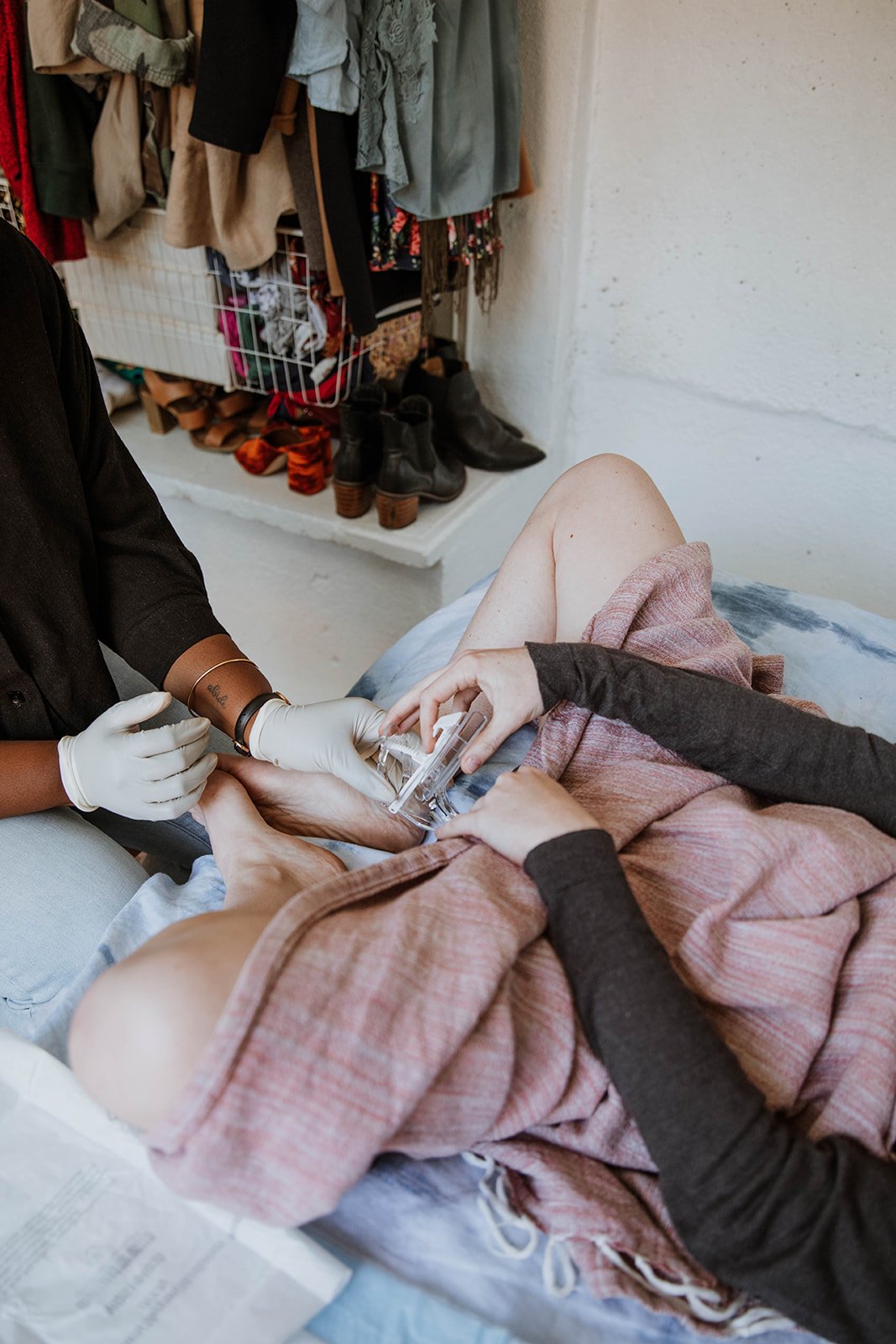Midwifery is More
When people hear I’m a midwife, they often imagine a lavender scented, blissed out home birth. In some cases, that’s exactly where I am. But midwifery encompasses so much more than home birth.
For the past few years, I’ve had to explain to people over and over that yes, as a midwife I can draw blood work and provide a Pap smear. We are just getting to a place where I’m not immediately asked “so, like a doula?” when I tell them I deliver babies at home. Baby steps. (Ha!) People’s lack of understanding about what midwives really do is not entirely their fault. From the erasure of Granny midwives to the current disconnect between various state licensure options, it’s no wonder many people are confused about what midwifery care really entails.
A midwife supporting a client as they insert their own speculum before at-home insemination
I’m here to explain it to you.Midwifery care is offering a listening ear and clinical reassurance when a mom of 2 decides to have an abortion.
Midwifery care is grounding a client using breathwork as you remove their IUD.
Midwifery care is transferring your beloved clients to the hospital when needed because their safety is more important than their home birth.
Midwifery care is holding your clients accountable to the stress management tools they shared because you love to see them thriving in their bodies.
As a home birth midwife, I am a trained healthcare provider who specializes in low-risk reproductive events like primary care screenings, pregnancy, and unmedicated vaginal birth. Yet, the midwifery care I offer extends beyond supporting a pregnancy or attending a home birth. I offer compassion and dialogue during a miscarriage and accessibility and reassurance during an abortion. I am someone who trusts each person with their body and acknowledges how all areas of life can affect reproductive health. In addition to home births, midwives can also attend births and provide care in hospitals, birth centers, and clinics. The clinical scope of midwives is similar to that of an OB/GYN. Here’s the main difference: Midwives specialize in uncomplicated obstetrical care. While there’s a lot of overlap in our roles, the approach and conversation created around sexual and reproductive health is drastically different. Midwives tend to take a more holistic approach to overall wellbeing. I incorporate nutrition, movement, stress management, bodywork, and trauma-informed care alongside my reproductive health clinical competency. Although I do not perform surgeries or specialize in high-risk reproductive health, I collaborate with obstetricians and maternal fetal specialists all the time to ensure continuity of care for my clients.Applying to medical school to become an OB actually crystallized many of my convictions about reproductive health and the importance of midwifery care. (Better late than never!) I was sitting with the other applicants during our second round of med school interviews when I realized I would be spending the rest of my life fighting a system, hoping it would allow me to offer a fraction of the care I get to offer as a midwife. To me, the midwifery model of care extends far beyond clinical practice. Most of us who become midwives are already living with firm convictions about bodily autonomy, choice, consent, inclusivity (not all of us, but that's another blog post), and trauma-informed care.Just Saving Lives. NBD.
Midwives provide healthcare through a lens that deeply respects personhood and the intricacies of reproductive events. With that perspective, there is no other way for me to practice than to offer my compassion, time, dialogue, shared responsibility, and personalized care.While many people are just starting to learn about the clinical side of midwifery care, the profession itself is age-old. For generations, midwives have been guiding teens through understanding their cycle, performing or providing support during an abortion, and offering prenatal and postpartum care during pregnancy. Grounded in the midwifery model, care is thorough, competent and client-centered.
